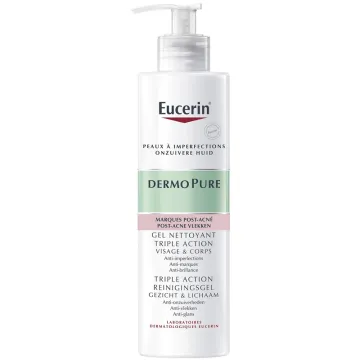

What are the main causes of acne marks?
Acne marks, often referred to as post-acne scars, generally result from inflammation of the skin lesions caused by acne. When skin pores become clogged with excess sebum, dead cells and bacteria, this can lead to swelling and rupture of the pore walls. If this rupture occurs close to the skin's surface, the lesion is often minor and heals quickly. However, if the rupture occurs more deeply, infectious material can spread, destroying skin tissue and leading to scarring. Factors that increase the risk of acne marks include genetics, choice of treatment, and pimple-handling behavior (such as popping).
How to prevent acne marks?
To prevent acne marks, it's essential to adopt the right skincare routine and treat acne at its earliest signs. Using gentle products specifically formulated for acne-prone skin is crucial. Avoiding excessive sun exposure and using a suitable sunscreen can also help reduce the risk of residual marks. It's also advisable not to manipulate pimples, i.e. avoid puncturing or squeezing them, which can aggravate inflammation and increase the risk of scarring.
What treatments are effective against acne marks?
Several treatments can help reduce the appearance of acne marks. Among topical options, creams based onhyaluronic acid, vitamin C and retinoids can be effective in promoting skin regeneration and reducing scarring. Professional treatments such as chemical peels, microdermabrasion and laser treatment can also be considered for more pronounced results. These treatments target the deeper layers of the skin to stimulate collagen production and improve skin texture.
How can natural treatments help reduce acne marks?
Natural remedies can also play a role in managing acne marks.Aloe vera, known for its soothing and regenerative properties, can be applied directly to scars to promote healing.Rosehip oil, rich in essential fatty acids and vitamin E, is renowned for its beneficial effects on skin repair and the reduction of hyperpigmentation. Although these natural treatments can help, they are generally less effective than medical treatments and should be used in conjunction with appropriate dermatological treatment.
When should I consult a dermatologist about acne marks?
It's advisable to consult a dermatologist if acne marks are severe, or if they don't improve with over-the-counter treatments. A dermatologist can assess the severity of scarring and recommend a suitable treatment plan, which may include prescription medication, cosmetic procedures or even advice on lifestyle changes. Making an appointment with a specialist can be a crucial step towards clearer skin and preventing further scarring.
What impact do hormones have on acne and its signs?
Hormones play a crucial role in the development of acne, especially androgens, which stimulate sebum production. Excessive sebum production can lead to clogged pores and skin inflammation, encouraging the appearance of acne and, potentially, residual marks. Hormonal fluctuations, often observed during puberty, menstrual cycles, pregnancy, or as a result of certain medications, can exacerbate these symptoms. Treatments that regulate these hormonal imbalances, such as contraceptive pills prescribed for acne, can be effective in reducing their impact.
How does nutrition influence acne marks?
Although the relationship between diet and acne is not fully elucidated, studies suggest that certain foods can worsen or improve skin conditions. Foods with a high glycemic index and dairy products have been associated with an increase in acne breakouts in some cases. On the other hand, a diet rich in fruits and vegetables, containing antioxidants, vitamins (such as vitamins A and E) and minerals, can help promote healthy skin and reduce the appearance of acne marks.
What are the risks associated with aggressive acne treatments?
Aggressive treatments, such as oral medications (like isotretinoin) and certain topical treatments (containing retinoids or strong acids), can be highly effective against acne. However, they carry risks of side effects, including skin dryness, photosensitivity and, in rare cases, more severe reactions such as liver disorders or increased cholesterol. It is crucial to consult a dermatologist to monitor these treatments and minimize the risk of complications.
How important is regular dermatological follow-up for people suffering from severe acne?
Regular dermatological follow-up is essential for severe acne sufferers, as it enables treatments to be adjusted as the skin evolves, and helps prevent scarring. The dermatologist can also detect signs of adverse reactions to treatments and intervene quickly to adjust them. This follow-up maximizes treatment efficacy while minimizing side effects and the risk of permanent scarring.
Are there any recent innovations in the treatment of acne marks?
The dermatology industry continues to progress, with the emergence of new technologies and active substances to treat acne and acne marks. For example, treatments using advanced laser technologies, such as fractionated laser, offer greater precision in targeting and treating damaged skin layers without affecting surrounding tissue. In addition, advances in topical product formulations, including nanotechnologies for better delivery of active ingredients, promise significantly improved results for those affected by acne marks. These innovations offer more effective and less invasive options for patients seeking to repair acne scars.